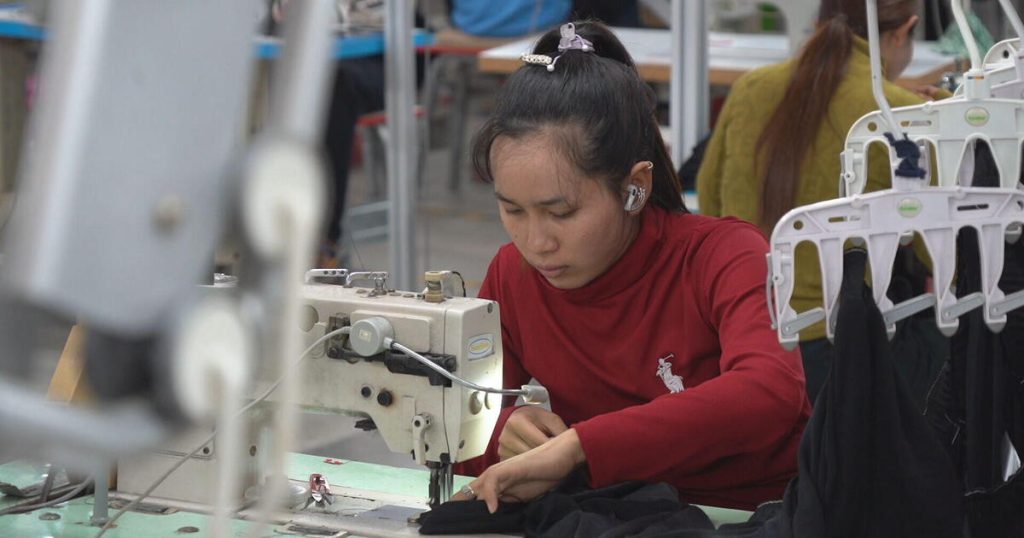In a dramatic shift of manufacturing dynamics, Cambodian factories are witnessing an influx of Chinese investment as businesses relocate to sidestep the tariffs imposed by the U.S. amid the ongoing trade war. A recent visit to an expanding Special Economic Zone near Phnom Penh revealed a surge in Chinese manufacturing ventures, spurred by the need for cost-effective solutions in light of recent tariffs on goods imported from China. The ramifications of these changes are significant for both Cambodia and the larger geopolitical landscape.
| Article Subheadings |
|---|
| 1) The Rise of the Special Economic Zone in Cambodia |
| 2) Economic Implications of Chinese Investment |
| 3) Effects of the U.S.-China Trade War |
| 4) Concerns for Cambodia’s Future Economy |
| 5) The Potential for Escalation in Trade Tensions |
The Rise of the Special Economic Zone in Cambodia
The development of a Special Economic Zone (SEZ) in southern Cambodia marks a pivotal moment in the nation’s industrial growth. This area, characterized by extensive construction and increasing Chinese presence, is designed to attract foreign investment, particularly in manufacturing. Semi-trucks laden with goods signal a bustling site where factories are rapidly being established. As businesses relocate from China to Cambodia, they do so partly to escape the financial constraints imposed by U.S. tariffs. The significance of the arch displaying both Khmer and Chinese signs at the SEZ highlights the new economic alliances being formed and the growing influence of China in Cambodia.
Economic Implications of Chinese Investment
The influx of Chinese investment into Cambodia is not just a trend; it represents a profound economic shift for the Southeast Asian nation. By 2020, it was reported that Chinese-owned factories accounted for more than half of the manufacturing facilities in Cambodia. This surge in investment reflects a total of approximately $9 billion from Chinese sources, which has become increasingly important given Cambodia’s reliance on exports to the U.S. Initially, in 2016, exports were valued at around $3 billion annually, but by the previous year, the figure had skyrocketed to more than $13 billion, constituting nearly 30% of Cambodia’s GDP.
Effects of the U.S.-China Trade War
The context of the escalating U.S.-China trade war has been a major driver behind this shift in manufacturing. The introduction of tariffs by the Trump administration, including a blanket tariff of 10% on Chinese imports, prompted many companies to consider relocating their operations to avoid the financial consequences of these duties. This strategic move illustrates a calculated response to external pressures in the global market; companies like the furniture factory previously mentioned have already transitioned to Cambodia as a direct result of increasing tariffs. As U.S. tariffs contemplate expanding to cover even more imports, Cambodian factories increasingly become attractive alternatives for Chinese manufacturers.
Concerns for Cambodia’s Future Economy
While Cambodian leaders welcome the influx of foreign investment, experts warn of potential risks to the economy that may arise from such heavy reliance on exports to the U.S. The dependency on American consumers puts Cambodian businesses in a precarious position. As pointed out by local officials, there are fears that if U.S. tariffs were to be targeted at goods made in Cambodia, the economic fallout would be significant. Business owners like Mr. Huang, a garment factory owner, express valid concerns over the sustainability of their enterprises. With approximately 60% of his business reliant on U.S. markets, the implications of changing trade dynamics could be detrimental.
The Potential for Escalation in Trade Tensions
As the trade war shows no signs of abating, the landscape for Cambodian manufacturers may be subject to further upheaval. With U.S. officials targeting arguments surrounding trade imbalances and intellectual property rights, the potential for increased tariffs on Cambodian exports becomes a pressing reality. Already, further tariffs are being threatened as part of the broader strategy to combat the flow of goods deemed problematic. As observed by industry leaders, the ongoing trade skirmish raises questions about the future profitability of businesses operating in Cambodia, especially if prices increase due to new tariffs.
| No. | Key Points |
|---|---|
| 1 | Chinese investment in Cambodia is rapidly increasing due to U.S. tariffs on Chinese goods. |
| 2 | The Special Economic Zone signifies an important development in Cambodian manufacturing. |
| 3 | Cambodia’s economy is heavily reliant on exports to the U.S., raising concerns over vulnerability. |
| 4 | The U.S.-China trade war is forcing companies to evaluate options for production and manufacturing. |
| 5 | Future escalation of tariffs could negatively impact Cambodian manufacturing operations. |
Summary
The geopolitical dynamics surrounding U.S. and Chinese trade relations are reshaping the industrial landscape in Cambodia, driving significant economic changes. As more Chinese factories set up operations to circumvent tariffs, the nation faces both opportunities and threats. With such a substantial portion of its economy tied to U.S. exports, Cambodia must navigate the complexities of international trade while seeking to protect its growing manufacturing sector.
Frequently Asked Questions
Question: Why are Chinese companies moving to Cambodia?
Chinese companies are relocating to Cambodia primarily to avoid U.S. tariffs on Chinese goods, allowing them to maintain market access while reducing costs.
Question: How are tariffs affecting Cambodian exports?
Tariffs from the U.S. impose additional costs on goods entering the market, which could jeopardize Cambodia’s exports, especially since a large portion is directed towards U.S. consumers.
Question: What does the future hold for Cambodian factories amidst the trade tensions?
The future of Cambodian factories remains uncertain as ongoing trade tensions could lead to the imposition of tariffs on goods manufactured there, impacting their profitability and sustainability.


